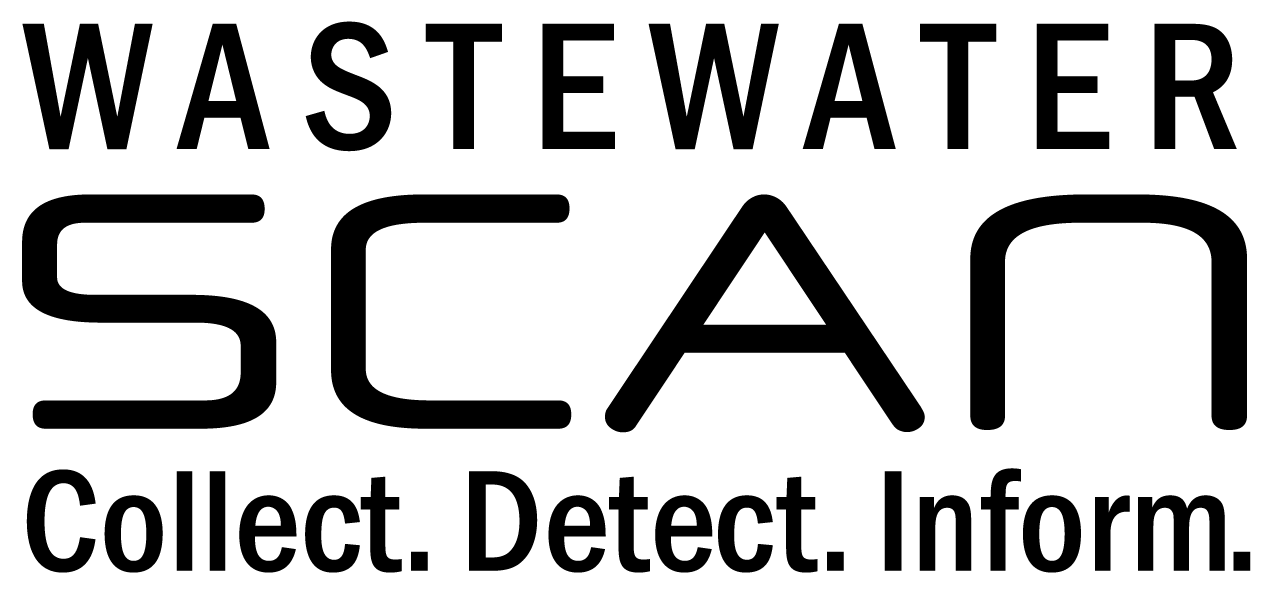Nationwide WWSCAN September 2024 Update
Hi everyone,
This newsletter contains updates on the WastewaterSCAN program with wastewater samples analyzed by the lab through September 30, 2024. Below you will find information on the program in terms of participating partners, review of targets being measured, as well as current wastewater categories (low, medium, high) of the infectious disease targets.
Ali & Marlene
Participating Plants
147 WWTPs plants sampling across 40 states
WastewaterSCAN Participant Stats:
- 147 plants sampling
- >37 million people covered through sampling efforts
- 40 states
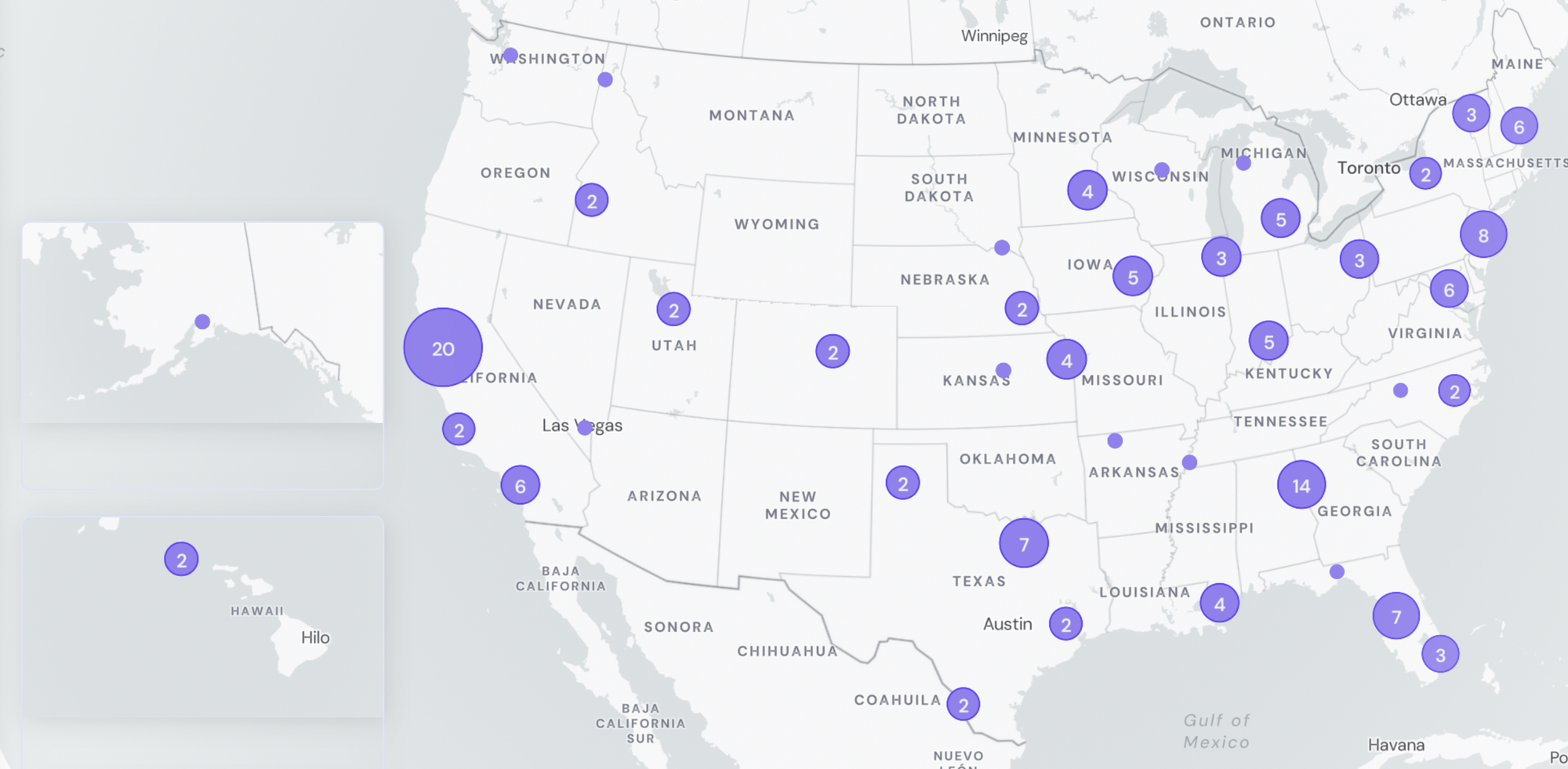
Infectious Disease Target Review
Currently monitoring a suite of Respiratory, Gastrointestinal and Outbreak Pathogens of Concern
The methods for our assays are in the public domain and links for these are provided at the end of the newsletter.
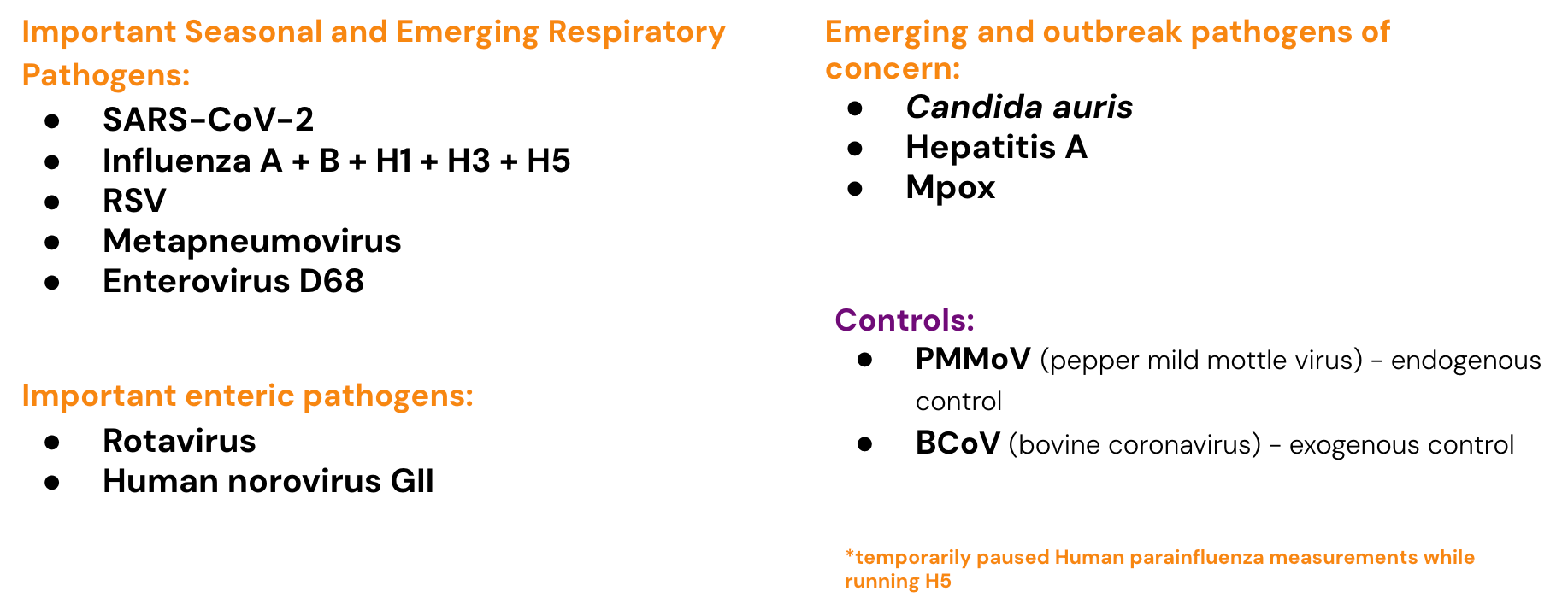
Program Publications
WastewaterSCAN Published Body of Work document:
- We are excited to share a document that provides an overview of the program’s peer-reviewed scientific literature, organized by topics and themes. Click here to access the WastewaterSCAN published body of work.
Peer-Reviewed Scientific Publications Released within the Last 3 Months:
- Prospective study of Candida auris nucleic acids in wastewater solids in 190 wastewater treatment plants in the United States suggests widespread occurrence
- Detection of Hemagglutinin H5 Influenza A Virus Sequence in Municipal Wastewater Solids at Wastewater Treatment Plants with Increases in Influenza A in Spring, 2024
COVID-19
SARS-CoV-2 concentration in wastewater and sequencing for variants
SARS-CoV-2 N gene RNA median concentration across all sites in September 2024 was 85,901 copies/gram. For reference, the median concentration in August 2024 was 182,288 copies/gram. Below is the population weighted average SARS-CoV-2 N gene concentrations (normalized by PMMoV) is shown in black from all participating WWSCAN sites across the country over the last 365 days.

Nationally, SARS-CoV-2 is in the "Medium" category with aggregated measurements showing medium concentrations and a downward trend over the last 3 weeks.
The Midwest and Northeast are in the "High" Wastewater Category due to high concentrations, with the Northeast showing a downward trend in the last 3 weeks and the Midwest showing no significant trend over the last 3 weeks. The West is in the "Medium" Wastewater Category due to medium concentrations but no significant trend over the last 3 weeks. The South is in the "Low" Wastewater Category due to low concentrations and a downward trend in the last 3 weeks.
Below are the current SARS-CoV-2 wastewater categories for all WWSCAN sites (recall the category is determined by both the trend and the level):
- 57 are in the LOW Wastewater Category
- 48 are in the MEDIUM Wastewater Category
- 31 are in the HIGH Wastewater Category
- 11 do not have enough data to calculate
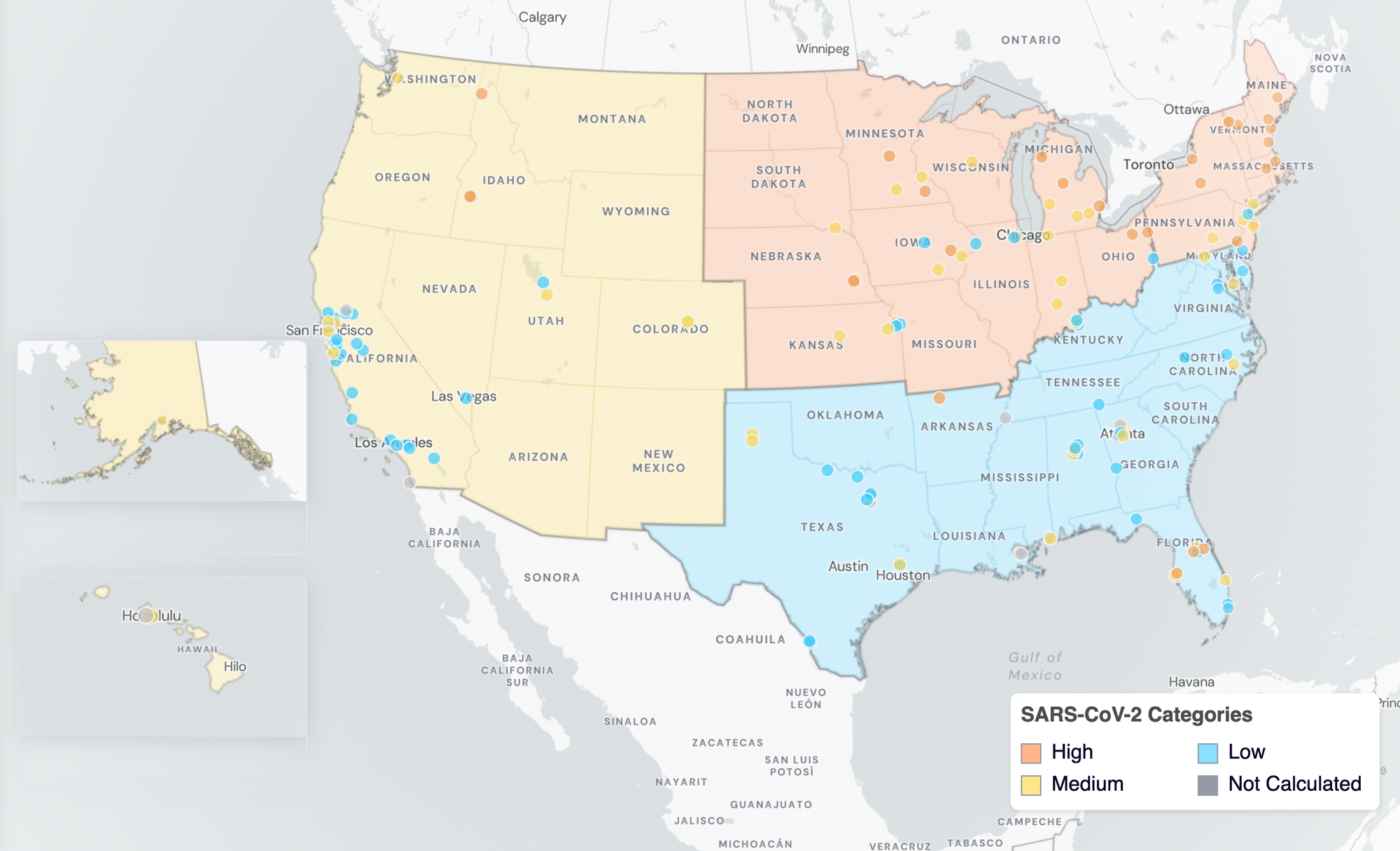
SARS-COV-2 Wastewater Categories. This map includes sample collection data through September 30, 2024. Each dot represents a single site and the four US Census regions are outlined in gray. Midwest Region includes: IA, IL, IN, KS, MI, MN, NE, OH, SD, WI. Northeast Region includes: CT, MA, ME, NH, NJ, NY, PA, VT. Southern Region includes: AL, AR, DE, FL, GA, KY, LA, MD, MS, NC, TN, TX, VA, and WV. Western Region includes: AK, CA, CO, HI, ID, NV, UT, WA.
Sequencing of SARS-CoV-2 from wastewater is available for a select number of individual sites. The sequencing protocol is available on protocol.io. The plots below show the relative proportions of different variants inferred from sequencing the entire genome of SARS-CoV-2. Results are based on sequencing of 2 samples per week, combined to provide a weekly value.
Sequencing data is also available in aggregate across all sites in WWSCAN with sequencing data. That plot is shown below and also suggests that KP.3 (shown in light blue) is the most abundant variant across all sites (55.7%) followed by JN.1.11 (shown in dark green) (15.5%) and KP.2 (shown in slate blue) (12.1%).

Other Respiratory Pathogens
Influenza A & B, Respiratory Syncytial Virus, Human metapneumovirus, Human Parainfluenza & EV-D68
Influenza A (IAV) RNA median concentration across all sites September 2024 was below the limit of detection. For reference, the median concentration in August 2024 was below the limit of detection as well. Below is the population weighted average IAV concentrations (normalized by PMMoV) is shown in black from all participating WWSCAN sites across the country over the last 365 days.

Nationally, Influenza A is in the "Low" Wastewater Category with <50% of sites showing onset of IAV in wastewater.
Below are the current Influenza A wastewater categories for all WWSCAN sites (recall the category is determined by both the trend and the level when in seasonal onset):
- 135 are in the LOW Wastewater Category
- 1 are in the MEDIUM Wastewater Category
- 0 are in the HIGH Wastewater Category
- 11 do not have enough data to calculate
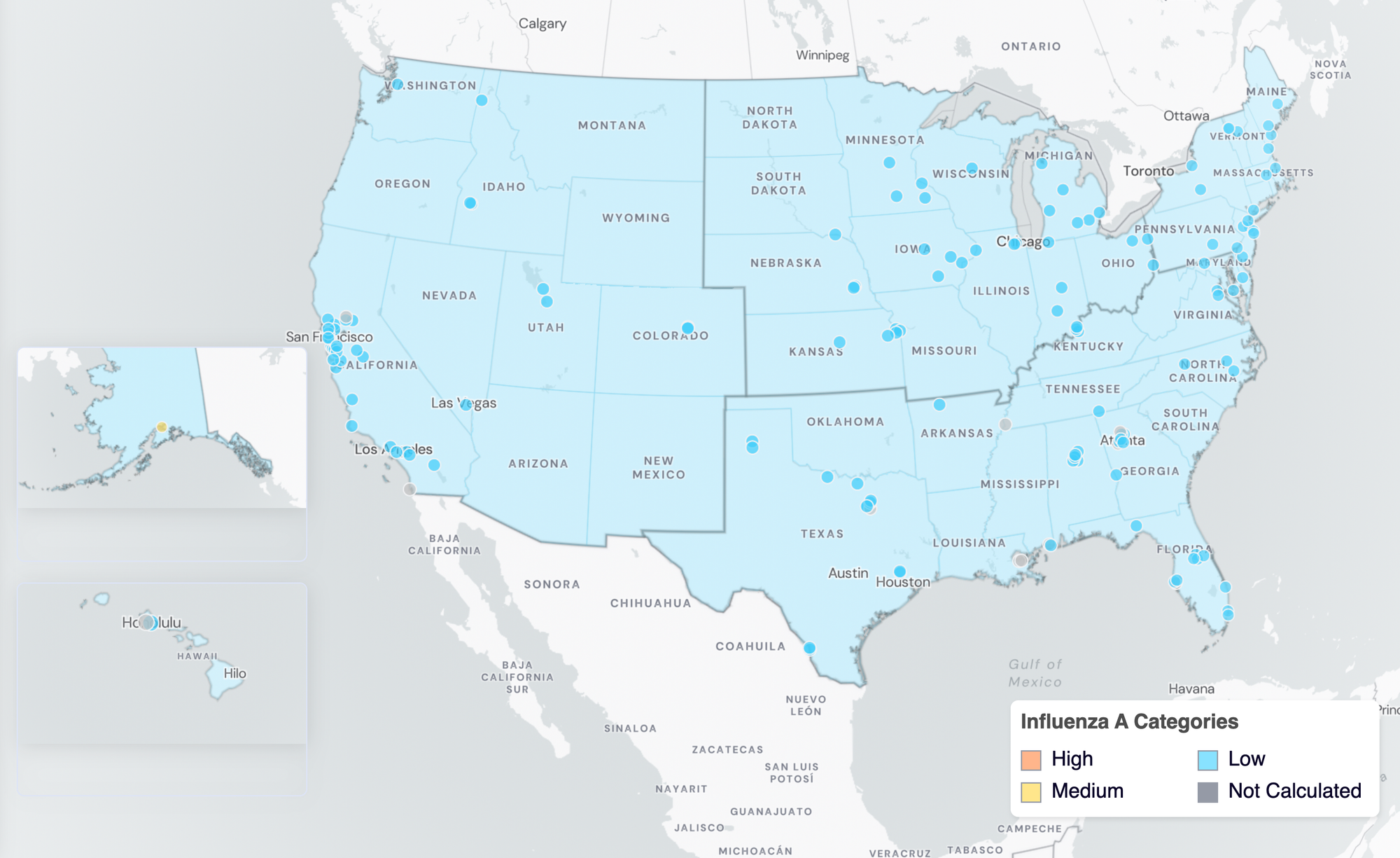
Influenza A Wastewater Categories. This map includes sample collection data through September 30 2024. Each dot represents a single site and the four US Census regions are outlined in gray. Midwest Region includes: IA, IL, IN, KS, MI, MN, NE, OH, SD, WI. Northeast Region includes: CT, MA, ME, NH, NJ, NY, PA, VT. Southern Region includes: AL, AR, DE, FL, GA, KY, LA, MD, MS, NC, TN, TX, VA, and WV. Western Region includes: AK, CA, CO, HI, ID, NV, UT, WA.
H1 Marker in Influenza A (IAV) We are temporarily pausing the influenza H1 assay while we prepare a new assay. We hope to be able to resume H1 testing within the next two months. Over the summer, we noted that the RNA sequence in the region of the H1N1 HA gene that the H1 assay targets mutated. There were a large number of influenza A H1N1 sequences added to public databases over the summer that made it possible to observe these changes; sequencing of isolates occurred more often than normal over the summer due to the H5N1 outbreak. The sequences in certain regions of viral genomes can evolve rapidly and influenza A is known to be a virus that does evolve and change over time. As part of our ongoing efforts, WastewaterSCAN actively monitors changing sequences for all of our targets, ensuring the assays continue to be sensitive and specific.
H3 Marker in Influenza A (IAV) Since we started monitoring for the H3 marker in influenza A, 8 WastewaterSCAN sites have seen positive detections. You can find a heat map of positive detections here.
H5 Marker in Influenza A (IAV) As of September 30, 2024, monitoring for the H5 marker in influenza A, 29 WastewaterSCAN sites have seen positive detections. You can find a heat map of positive detections here.


Influenza B (IBV) RNA was detected in ~2.3% of samples in September 2024. IBV RNA median concentration across all sites in September 2024 was below the limit of detection. Below the population-weighted average IBV RNA concentrations (normalized by PMMoV) is shown in black from all participating WWSCAN sites across the country over the last 365 days.
Nationally, Influenza B is in the "Low" Wastewater Category with <50% of sites showing onset of IBV in wastewater.

Below are the current Influenza B wastewater categories for all WWSCAN sites (recall the category is determined by both the trend and the level when in seasonal onset):
- 136 are in the LOW Wastewater Category
- 0 are in the MEDIUM Wastewater Category
- 0 are in the HIGH Wastewater Category
- 11 do not have enough data to calculate
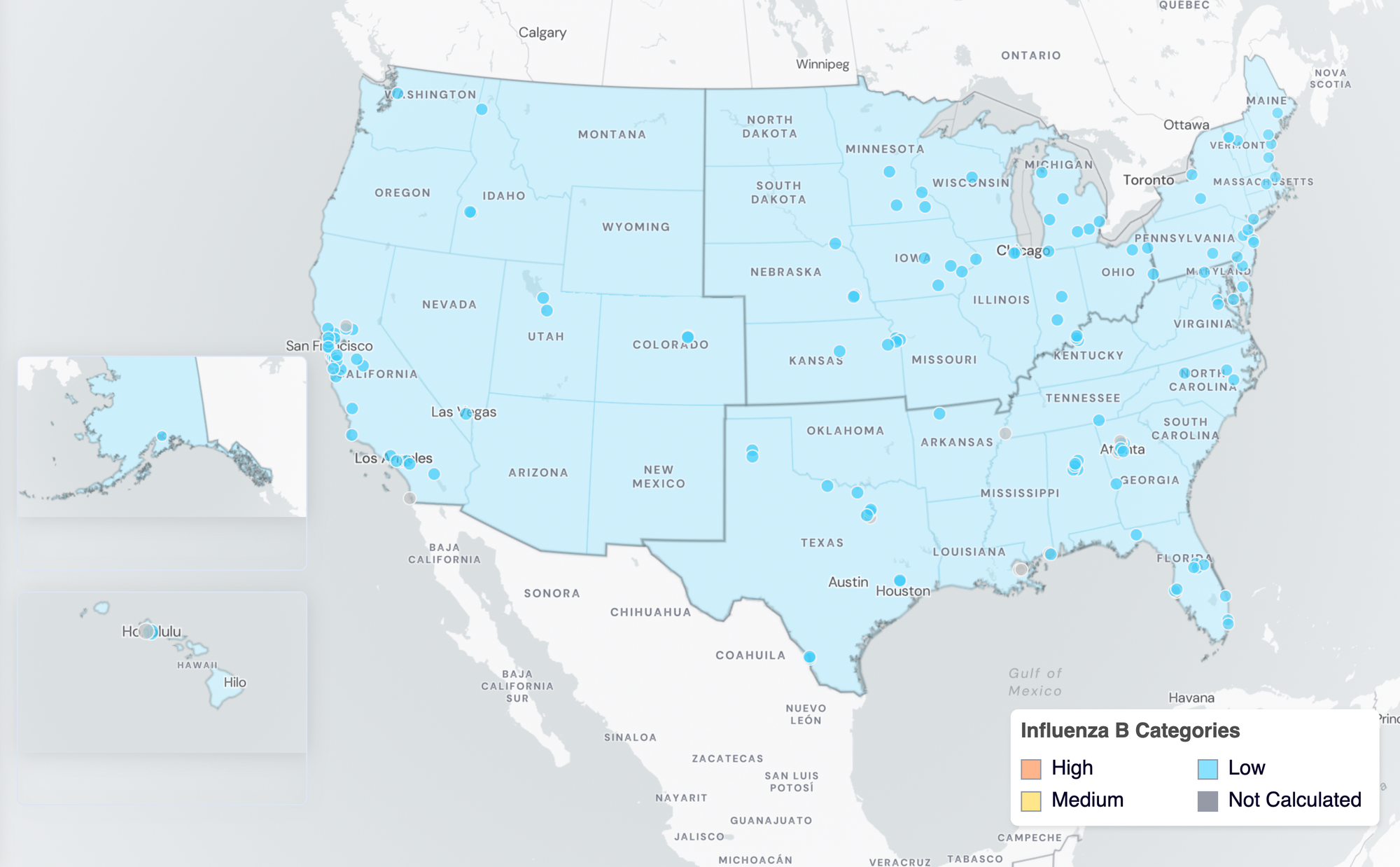
IBV Wastewater Categories. This map includes sample collection data through September 30, 2024. Each dot represents a single site and the four US Census regions are outlined in gray. Midwest Region includes: IA, IL, IN, KS, MI, MN, NE, OH, SD, WI. Northeast Region includes: CT, MA, ME, NH, NJ, NY, PA, VT. Southern Region includes: AL, AR, DE, FL, GA, KY, LA, MD, MS, NC, TN, TX, VA, and WV. Western Region includes: AK, CA, CO, HI, ID, NV, UT, WA.
Respiratory syncytial virus (RSV) RSV RNA median concentration across all sites in September 2024 was below the limit of detection. Below the population-weighted average RSV RNA concentrations (normalized by PMMoV) is shown in black from all participating WWSCAN sites across the country over the last 365 days.

Nationally, RSV is in the "Low" Wastewater Category, with <50% of sites showing onset of RSV in wastewater.
Below are the current RSV wastewater categories for all WWSCAN sites (recall the category is determined by both the trend and the level when in seasonal onset):
- 134 are in the LOW Wastewater Category
- 0 are in the MEDIUM Wastewater Category
- 2 are in the HIGH Wastewater Category
- 11 do not have enough data to calculate
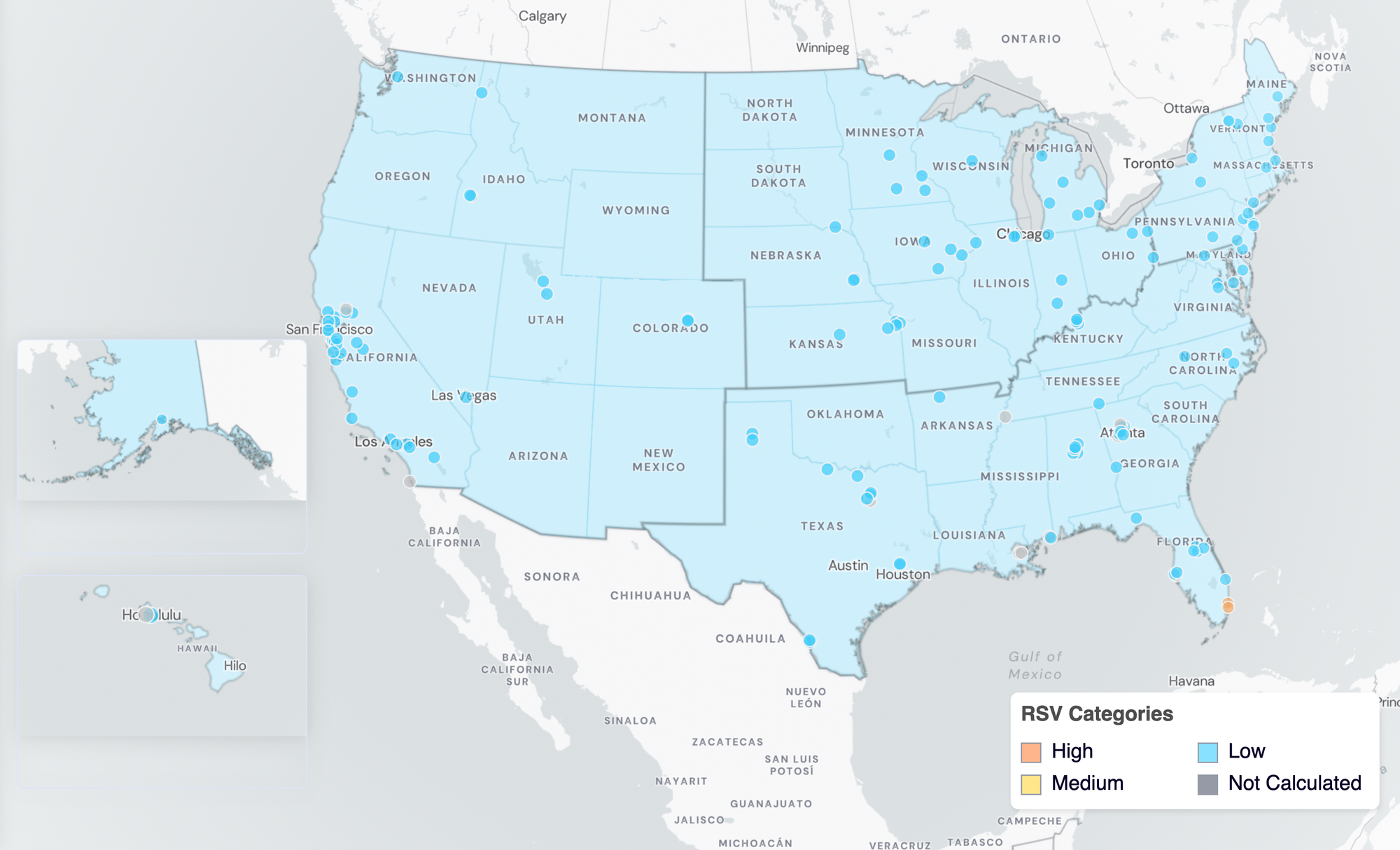
RSV Wastewater Categories. This map includes sample collection data through September 30, 2024. Each dot represents a single site and the four US Census regions are outlined in gray. Midwest Region includes: IA, IL, IN, KS, MI, MN, NE, OH, SD, WI. Northeast Region includes: CT, MA, ME, NH, NJ, NY, PA, VT. Southern Region includes: AL, AR, DE, FL, GA, KY, LA, MD, MS, NC, TN, TX, VA, and WV. Western Region includes: AK, CA, CO, HI, ID, NV, UT, WA.
HMPV (human metapneumovirus) RNA median concentrations across all sites in September 2024 was below the level of detection. HMPV RNA was detected in ~2.1% of samples in September 2024. Below is the population weighted average HMPV RNA concentrations (normalized by PMMoV) shown in black from all participating WWSCAN sites across the country over the last 365 days.

Nationally, HMPV is in the "LOW" Wastewater Category with <50% of sites showing onset of HMPV in wastewater.
Below are the current HMPV wastewater categories for all WWSCAN sites (recall the category is determined by both the trend and the level):
- 136 are in the LOW Wastewater Category
- 0 are in the MEDIUM Wastewater Category
- 0 are in the HIGH Wastewater Category
- 11 do not have enough data to calculate
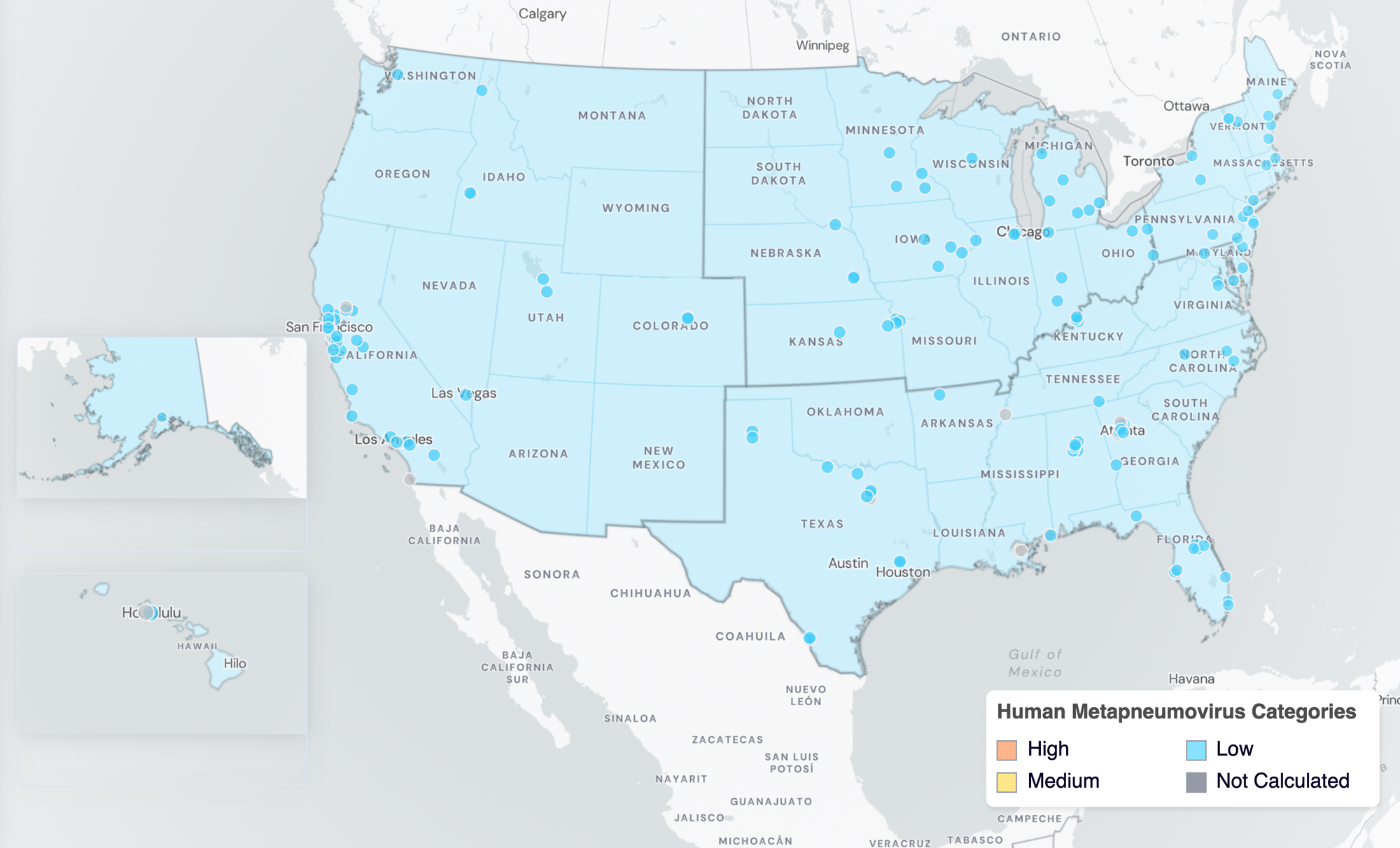
HMPV Wastewater Categories. This map includes sample collection data through September 30, 2024. Each dot represents a single site and the four US Census regions are outlined in gray. Midwest Region includes: IA, IL, IN, KS, MI, MN, NE, OH, SD, WI. Northeast Region includes: CT, MA, ME, NH, NJ, NY, PA, VT. Southern Region includes: AL, AR, DE, FL, GA, KY, LA, MD, MS, NC, TN, TX, VA, and WV. Western Region includes: AK, CA, CO, HI, ID, NV, UT, WA.
Enterovirus D68 (EV-D68) RNA was detected in ~74.7% of samples collected in September 2024 across WWSCAN sites and the median concentration across all sites was 7,442 copies/gram (for reference median concentration in July 2024 was below the limit of detection). Below is the population-weighted average EV-D68 RNA(normalized by PMMoV) shown in black from all participating WWSCAN sites across the country over the last 365 days.

Nationally, EV-D68 is in the "Medium" Wastewater Category with >50% of positive detections in samples from the last 3 weeks.
Below are the current EV-D68 wastewater categories for all WWSCAN sites (recall the category is determined by the frequency of detection):
- 32 are in the LOW Wastewater Category
- 104 are in the MEDIUM Wastewater Category
- 0 are in the HIGH Wastewater Category
- 11 do not have enough data to calculate
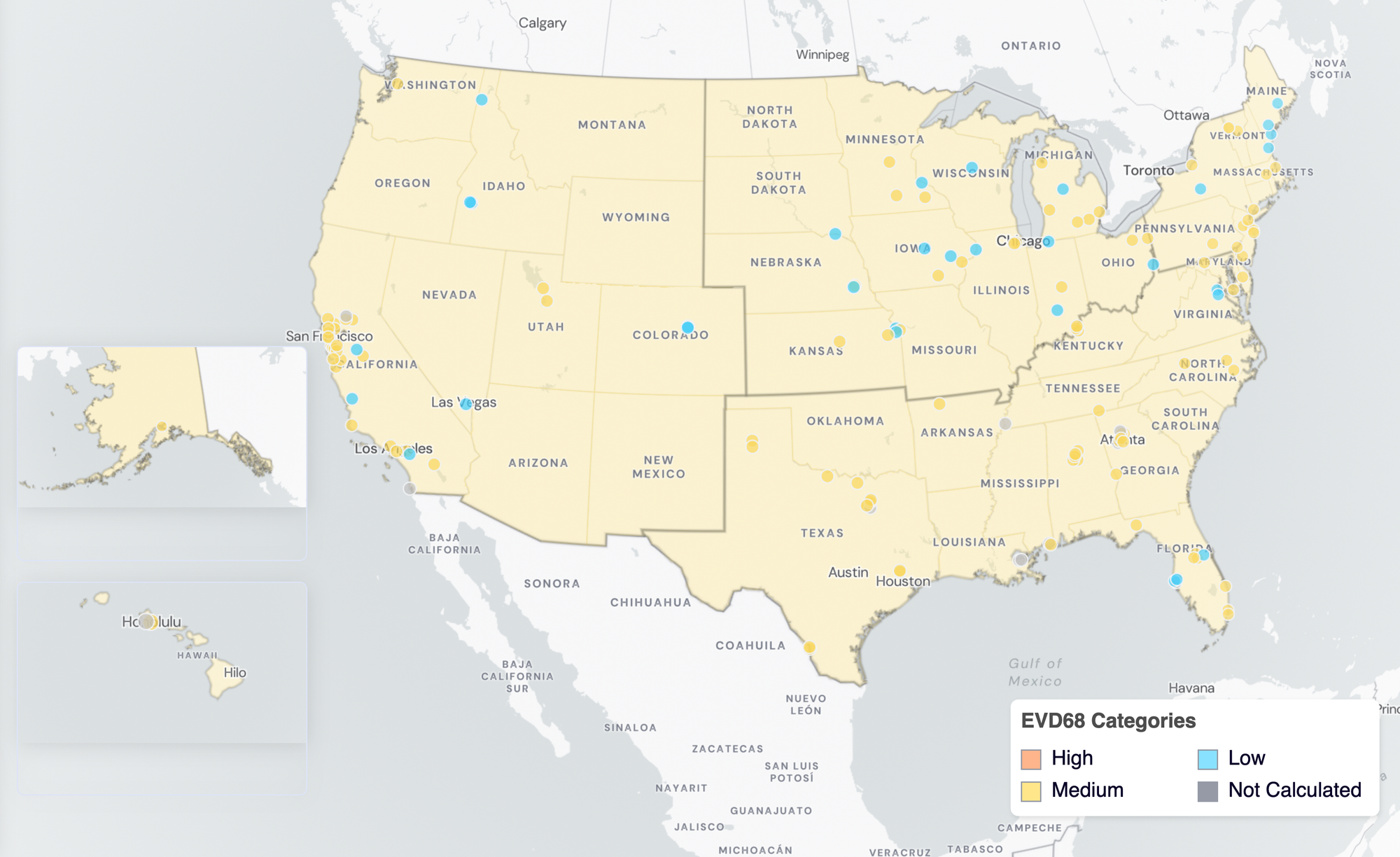
EV-D68 Wastewater Categories. This map includes sample collection data through September 30, 2024. Each dot represents a single site and the four US Census regions are outlined in gray. Midwest Region includes: IA, IL, IN, KS, MI, MN, NE, OH, SD, WI. Northeast Region includes: CT, MA, ME, NH, NJ, NY, PA, VT. Southern Region includes: AL, AR, DE, FL, GA, KY, LA, MD, MS, NC, TN, TX, VA, and WV. Western Region includes: AK, CA, CO, HI, ID, NV, UT, WA.
Gastrointestinal Pathogens
Norovirus GII and Rotavirus
Norovirus GII (HuNoV GII) RNA was detected in 100% of samples analyzed in September 2024. The median concentrations across all sites in September 2024 is 3,069,098 copies/gram (for reference median concentration in August 2024 was 4,426,500 copies/gram). Below is the population weighted average HuNoV GII RNA concentrations (normalized by PMMoV) shown in black from all participating WWSCAN sites across the country over the last 365 days.

Nationally, Norovirus is in the "High" Wastewater Category with aggregated measurements showing medium concentrations and a significant upward trend over the last 3 weeks.
Below are the current Norovirus wastewater categories for all WWSCAN sites (recall the category is determined by both the trend and the level):
- 60 are in the LOW Wastewater Category
- 54 are in the MEDIUM Wastewater Category
- 22 are in the HIGH Wastewater Category
- 11 do not have enough data to calculate
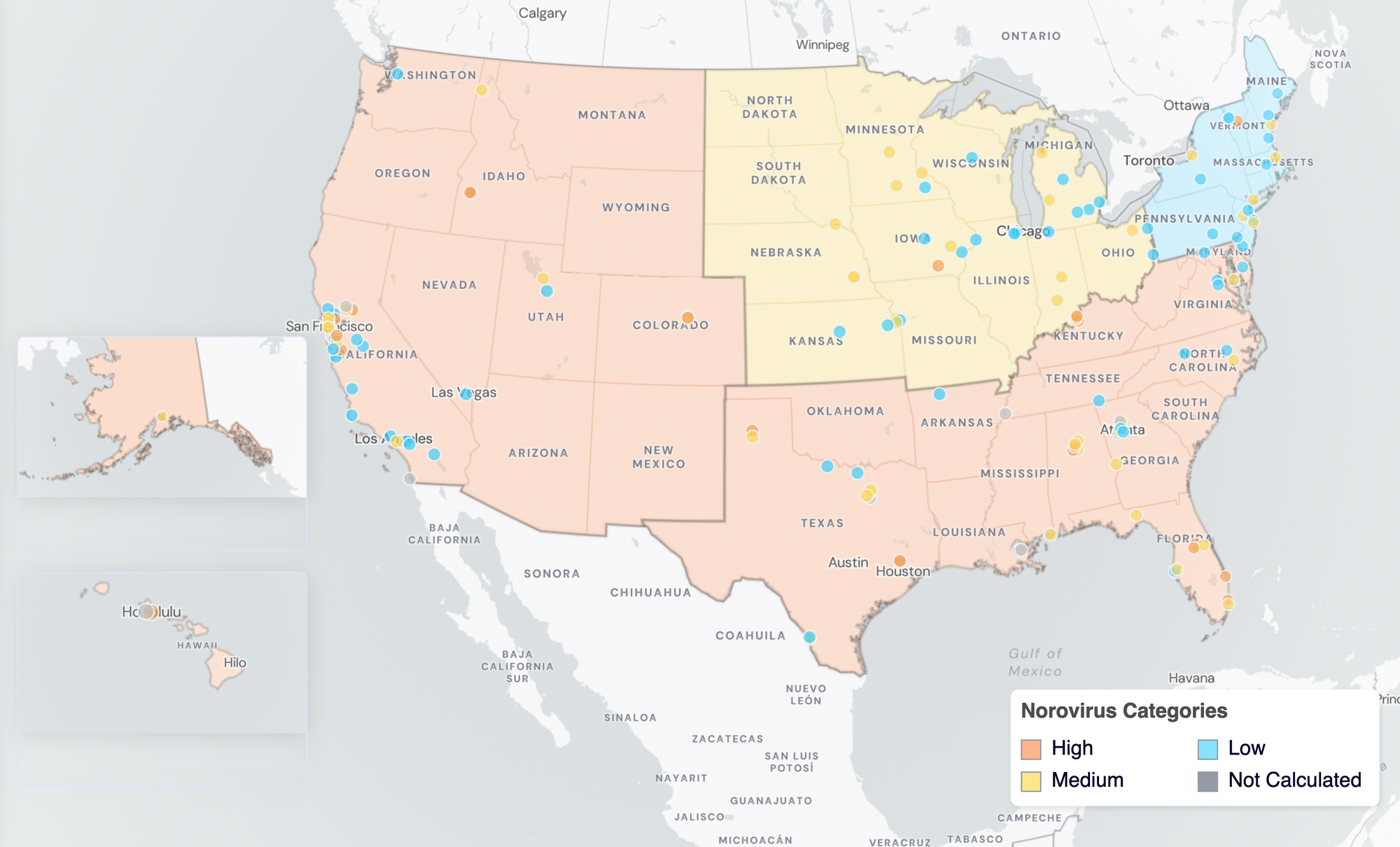
Norovirus Wastewater Categories. This map includes sample collection data through September 30, 2024. Each dot represents a single site and the four US Census regions are outlined in gray. Midwest states: IA, IL, IN, KS, MI, MN, NE, OH, SD, WI. Northeast states: CT, MA, ME, NH, NJ, NY, PA, VT. Southern states: AL, AR, DE, FL, GA, KY, LA, MD, MS, NC, TN, TX, VA, and WV. Western States: AK, CA, CO, HI, ID, NV, UT, WA.
Rotavirus RNA median concentrations across all sites in September 2024 is 4,118 copies/gram. For reference, the median concentration in August 2024 was 8,205 copies/gram. Below the popluation-weighted average Rotavirus RNA concentrations (normalized by PMMoV) is shown in black from all participating WWSCAN sites across the country.

Rotavirus is in the "Low" Wastewater Category nationally with aggregated measurements showing low concentrations with a no significant upward or downward trend in the last 3 weeks.
Below are the current Rotavirus wastewater categories for all WWSCAN sites (recall the category is determined by both the trend and the level):
- 104 are in the LOW Wastewater Category
- 26 are in the MEDIUM Wastewater Category
- 6 are in the HIGH Wastewater Category
- 11 do not have enough data to calculate
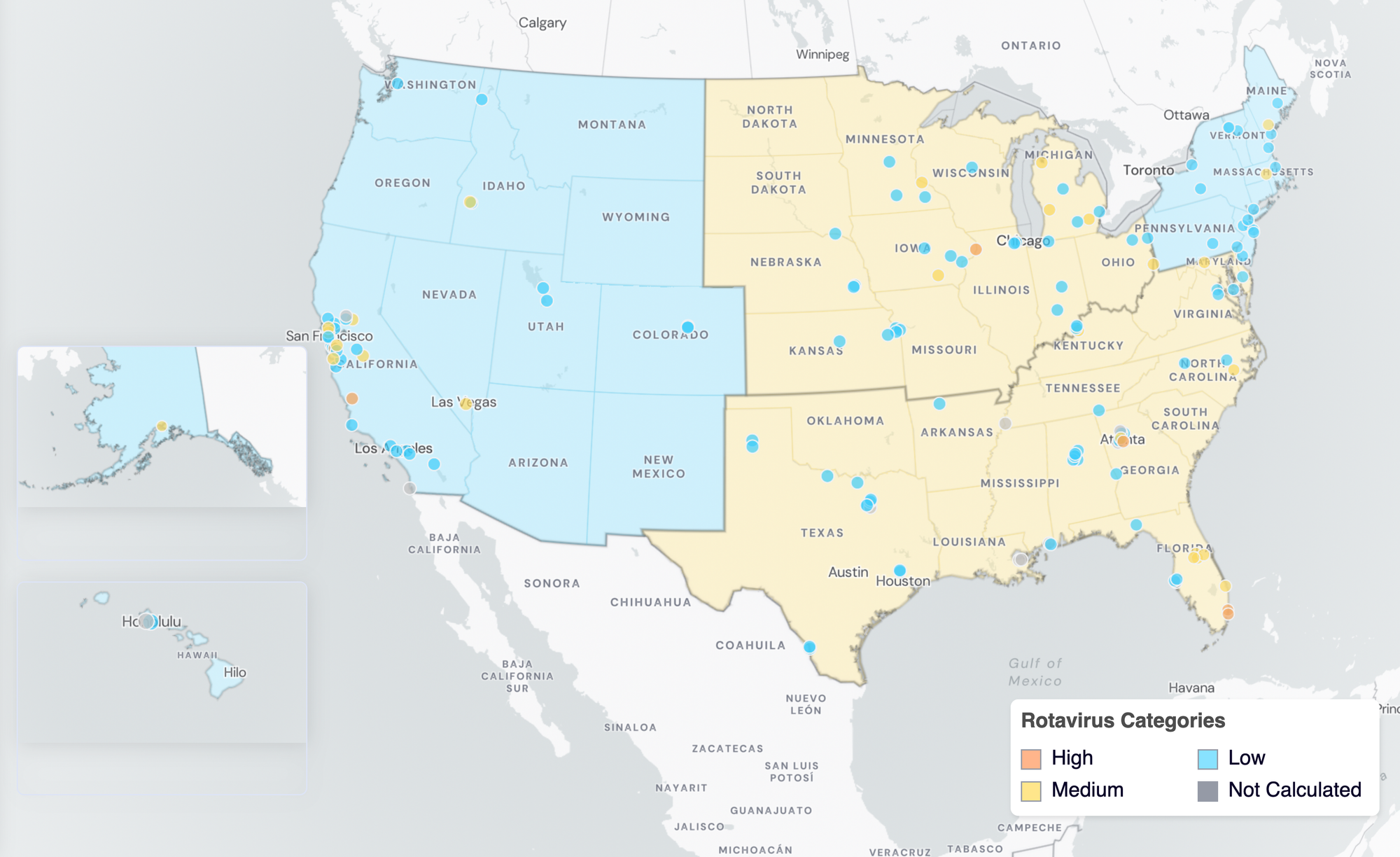
Rotavirus Wastewater Categories. This map includes sample collection data through September 30, 2024. Each dot represents a single site and the four US Census regions are outlined in gray. Midwest states: IA, IL, IN, KS, MI, MN, NE, OH, SD, WI. Northeast states: CT, MA, ME, NH, NJ, NY, PA, VT. Southern states: AL, AR, DE, FL, GA, KY, LA, MD, MS, NC, TN, TX, VA, and WV. Western States: AK, CA, CO, HI, ID, NV, UT, WA.
Other Pathogens of Concern
Mpox clade II, Candida auris, and Hepatitis A
Mpox clade II DNA - We have only detected mpox DNA in 6 samples in the month of September 2024. Nationally, Mpox clade II is in the "Low" category due to limited detections.
The chart below plants in HHS region 5 as rows, and days as columns (labeled at the bottom axis). White indicates no samples, blue is non-detect for mpox DNA and red is detect for mpox DNA.

Below are the Mpox clade II wastewater categories for all WastewaterSCAN sites (recall the category is determined by the frequency of detection):
- 136 are in the LOW Wastewater Category
- 0 are in the MEDIUM Wastewater Category
- 0 are in the HIGH Wastewater Category
- 11 do not have enough data to calculate
Candida auris (C.auris) DNA - We have detected C. auris DNA in ~0.3% of samples from all WWSCAN sites in September 2024. Nationally, C. auris is in the "Low" category due to limited detections.
The chart below shows plants in HHS region 1 as rows, and days as columns (labeled at the bottom axis). White indicates no samples, blue is non-detect for C. auris DNA and red is detect for C. auris DNA.

Below are the C. auris wastewater categories for all WastewaterSCAN sites (recall the category is determined by the frequency of detection):
- 136 are in the LOW Wastewater Category
- 0 are in the MEDIUM Wastewater Category
- 0 are in the HIGH Wastewater Category
- 11 do not have enough data to calculate
Hepatitis A (Hep A) RNA - We have detected Hep A RNA in ~12.3% of samples from all WWSCAN sites in September 2024. Nationally, HepA is in "Low" category due to limited detections.
The chart below shows each WWSCAN plant in HHS Region 6 as rows, and days as columns (labeled at the bottom axis). White indicates no samples, blue is a non-detect for Hep A RNA and red is a detection for Hep A RNA.

Below are the current HepA wastewater categories for all WWSCAN sites (the category is determined by the frequency of detection):
- 125 are in the LOW Wastewater Category
- 11 are in the MEDIUM Wastewater Category
- 0 are in the HIGH Wastewater Category
- 11 do not have enough data to calculate
WWSCAN protocols and methods
Protocols (Pre-analytical methods and SARS-CoV-2 analytical methods including controls):
- High Throughput RNA Extraction and PCR Inhibitor Removal of Settled Solids for Wastewater Surveillance of SARS-CoV-2 RNA
- High Throughput pre-analytical processing of wastewater settled solids for SARS-CoV-2 RNA analyses
- Quantification of SARS-CoV-2 variant mutations (HV69-70, E484K/N501Y, del156-157/R158G, del143-145, LPPA24S, S:477-505, and ORF1a Del 141-143) in settled solids using digital RT-PCR
- High Throughput SARS-COV-2, PMMoV, and BCoV quantification in settled solids using digital RT-PCR
Pre-prints and peer-reviewed publications provided WWSCAN methods:
- SARS-CoV-2
- Influenza, Human metapneumovirus, Respiratory syncytial virus, Human parainfluenza
- Mpox clade II
- Norovirus GII
- Adenovirus group F, Rotavirus
- Candida auris
- Hepatitis A
- Enterovirus D68
Join us at the next WWSCAN Stakeholder call on October 11, 2024
If you have questions about the website or anything else, please email: wwscan_stanford_emory@lists.stanford.edu
